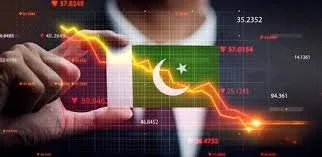Why resistance to economic reforms is not in Pak interest
By MNS
As Pakistan grapples with soaring debt and economic instability, opposition to vital reforms threatens to deepen the crisis
STATE OF THE NATION
THE recent strike by traders and businesspeople has emerged as an unwitting symptom of a deeper malaise. It echoes a familiar, knee-jerk response — one that reverberates through every attempt at reform, and against every policy decision meant to stave off the disintegration of an economy teetering on the brink.
Now consider this: Pakistan's economic and financial predicament has ceased to be a matter for debate. It is, tragically, a reality. The numbers are stark. Budgetary allocations announce the priorities and compulsions of the state in a manner more candid than any politician could muster:
Fiscal Year Total Expenditure (Rs Trillion) Debt Servicing (Rs Tr) Defence (Rs Tr) Other (Rs Tr)
2025–26 17.57 8.20 2.55 5.52
2024–25 18.87 9.77 2.12 5.30
2021–22 8.48 3.06 1.37 3.09
What do these figures reveal? They show the inexorable rise of debt servicing, which now accounts for the largest slice of the national budget, crowding out expenditure on health, education, and development. The country's debt servicing requirements — which stood at 36 per cent of the total outlay in 2021–22 — now constitute 47 per cent of total expenditure for 2025–26. In other words, about half the country's revenue goes into retiring debt or paying interest. Against this backdrop, resistance to reform is more than unwise — it risks nudging the country further into the abyss.
Perils of perpetual opposition
Reform, by its very nature, is disruptive. But the habitual stance of opposing every remedial measure — be it privatisation, digitisation, or documentation — has done more harm than any single economic misadventure. Most notably:
Privatisation paralysis: State-owned behemoths such as the Pakistan International Airlines and Pakistan Steel Mills bleed approximately Rs800 billion each year. Decades of resistance to their privatisation or restructuring have yielded neither solutions nor alternatives; only mounting losses and dwindling hope.
Opposition to transparency: Efforts to introduce transparency — by requiring traders to share identification or pay fixed taxes — are met with relentless opposition. The net effect is a chronic shortfall in tax revenue and the persistence of a hidden, untaxed economy.
Evasion and lawlessness: Moves to penalise non-filers are trivialised, mocked, and resisted at every level. The joke, ultimately, is on the nation, which pays the price for endemic lawlessness.
Disempowering tax authorities: A strong Federal Board of Revenue (FBR) is vital for fiscal stability, but each attempt at empowerment is mired in controversy and delay, with political expediency trumping national interest.
Fear of technology: Digital invoicing and e-tracking — essential tools for a modern economy —are treated as threats rather than solutions, simply because they demand transparency and accountability.
Dependence on dollars: Chronic shortages and an insatiable appetite for imports — luxury and non-essential items alike — leave Pakistan at the mercy of the dollar, and successive governments are forced to turn to the IMF with a tin cup, again and again.
Unity, not division, is needed
In my view, any protest against the perceived excesses of reform is in truth a lament against progress itself. Opposition that focuses only on blocking reform — never proposing viable alternatives — serves no one but those invested in the status quo. It is time to distinguish between constructive dissent and self-sabotage.
Pakistan faces an existential threat. The economic crisis demands from its citizens sacrifices no less heroic than those made in times of war. Now, more than ever, unity is not a choice but a necessity. Every Pakistani — trader or technocrat, civil servant or citizen — should, therefore, rally behind efforts to broaden the tax net, support the ban on non-essential imports, and embrace the reforms essential for rescue. Governments come and go, but the fate of the nation is collective and indivisible.
Let us reject the urge to oppose everything, no matter how sensible. Only unity, courage, and moral clarity can chart a way out of the perfect storm we are facing now.
